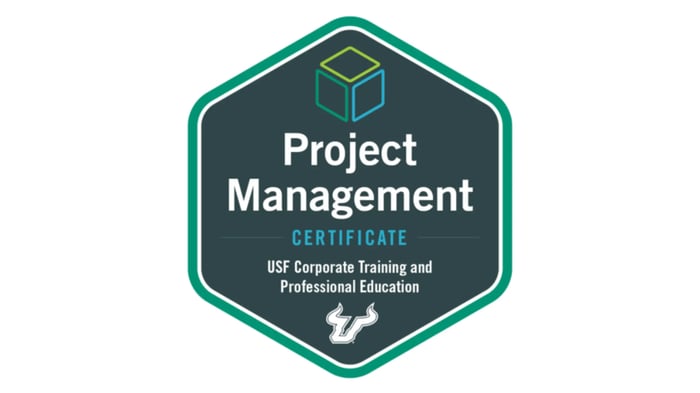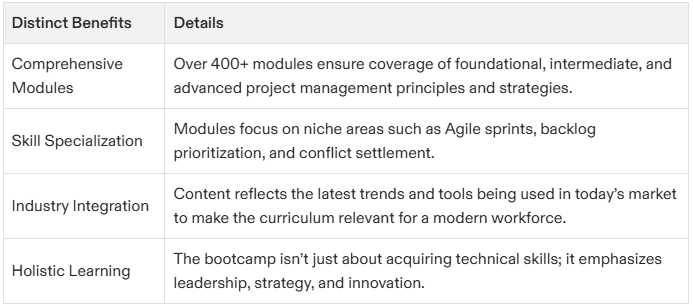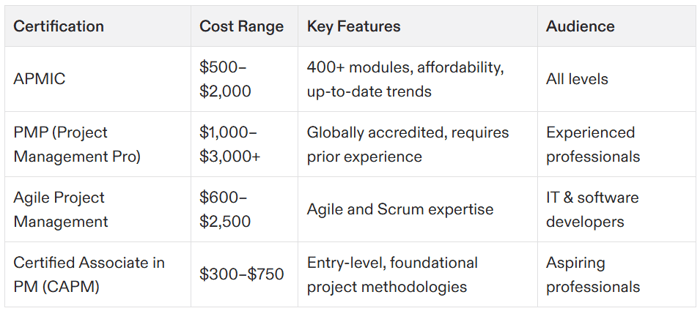Table of Contents
- Why Choose Project Management Certification USF?
- Curriculum Overview of Project Management Certification USF
- The Global Landscape: How USF Certification Compares
- The Growing Demand for Certified Project Managers
- How to Prepare for the USF Project Management Certification?
- How the USF Project Management Certification Compares to Other Certifications
- 10 Commonly Known Facts About Project Management Certification USF
- Final Thoughts
- FAQs
So, you want to take your career to the next level, right? Whether you’re eyeing that next promotion, seeking a role that’ll make your mom proud, or planning to become the project management rockstar of your industry, it’s time to talk about the Project Management Certification USF. But before you start imagining stacks of textbooks and caffeine-fueled nights, let’s clear something up: This isn’t your typical “boring” certification. No way. USF has designed a course that’s practical, flexible, and seriously relevant. Don’t worry, you won’t be alone on this journey—there’s a community of fellow learners, engaging content, and a track record of success waiting for you. Intrigued? Read on as we dive deep into everything you need to know about this certification and why it could be the key to unlocking your career’s full potential.
Why Choose Project Management Certification USF?
Project management has always been one of the most sought-after skills in the professional world. Whether you’re managing a small team or overseeing complex global projects, your ability to juggle tasks, manage resources, and deliver results can significantly impact your career. But it’s not just about getting the job done—it’s about doing it effectively, efficiently, and with a clear understanding of how the entire process fits into the larger organizational picture.
So why should you choose the USF Project Management Certification?
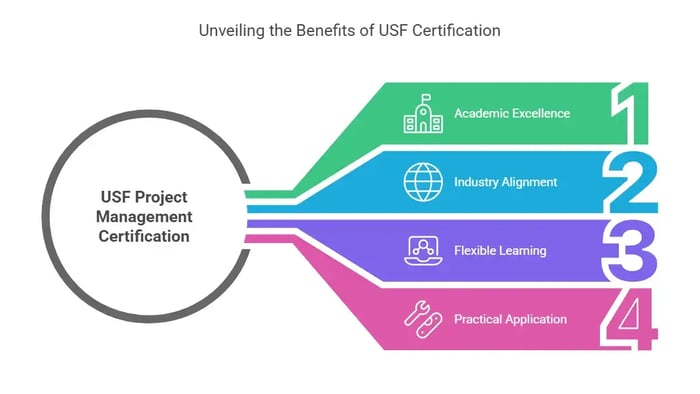
- Academic Excellence: The University of South Florida (USF) is renowned for its rigorous academic standards and commitment to delivering world-class education. With a USF Project Management Certificate, you’re not just earning a piece of paper—you’re gaining the credibility that comes with being associated with a globally recognized institution.
- Industry Alignment: The program is designed to align with industry standards, specifically the Project Management Professional (PMP) certification framework set by the Project Management Institute (PMI). What does that mean for you? It means that the skills and knowledge you gain will be applicable and recognized globally.
- Flexible Learning: For those who have a full-time job or busy schedule, the online format of the USF certification is a game-changer. You can study at your own pace, from anywhere, at any time, without sacrificing the quality of your learning.
- Practical Application: USF doesn’t just focus on theory. You’ll be diving into real-world case studies, simulations, and practical exercises that ensure you have the hands-on experience necessary to succeed in your projects.
These are just a few of the reasons why the Project Management Certification USF stands out. Let’s take a closer look at the actual curriculum, what you’ll learn, and how this program can directly impact your career.
Additionally, if you're wondering how project management certification can open doors to new career opportunities, be sure to check out this article on jobs with project management certification. It offers insights into various roles and industries that highly value certified project managers.
Curriculum Overview of Project Management Certification USF
At the heart of any great certification program lies a robust, carefully designed curriculum. The USF Project Management Certification is no different. The program combines fundamental principles of project management with cutting-edge tools and real-world applications, ensuring that graduates are ready to manage complex projects in diverse industries.
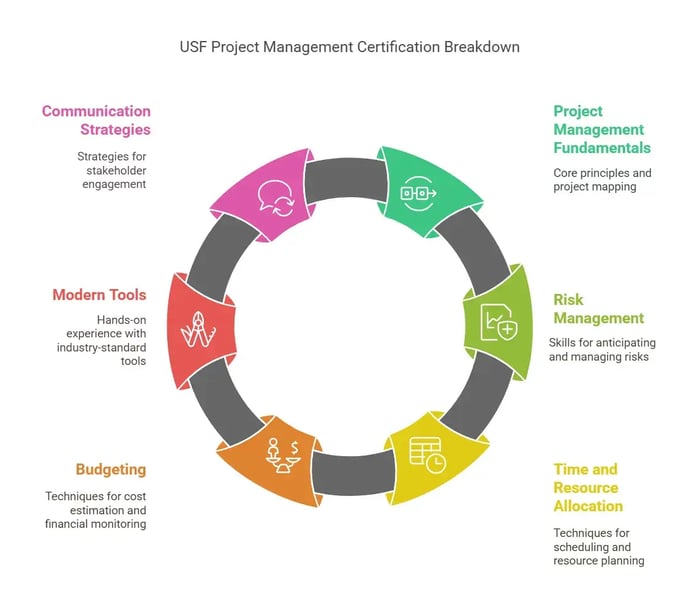
1. Introduction to Project Management Fundamentals - In this module, you’ll get a crash course in the core aspects of project management. From defining project scope and objectives to understanding stakeholder roles, this is your foundation. You'll learn to map out your projects, define deliverables, and structure your work for maximum efficiency.
2. Risk Management and Contingency Planning - Let’s face it—things don’t always go according to plan. This module equips you with the skills needed to foresee potential risks and prepare for the worst-case scenarios. You’ll study methods for evaluating risks and learn to create contingency plans that keep your projects on track, no matter what obstacles arise.
3. Time and Resource Allocation Techniques - Managing time and resources effectively is the backbone of successful project management. This module covers scheduling techniques, including PERT (Program Evaluation and Review Technique) and Gantt charts. You’ll also delve into resource capacity planning to ensure you’re making the best use of your team’s skills and time.
4. Budgeting and Financial Planning - Every project has a budget, and managing it properly can make or break your project’s success. In this module, you’ll learn about budgeting techniques, cost estimation, and financial monitoring tools to help you stay within budget while delivering quality results.
5. Modern Project Management Tools - Technology plays a huge role in today’s project management landscape. This module introduces you to industry-standard tools such as Jira, Microsoft Project, and other Agile collaboration platforms. You’ll get hands-on experience using these tools to enhance productivity, communication, and transparency within your team.
6. Communication and Stakeholder Engagement - Effective communication is key to any successful project. This module emphasizes strategies for keeping stakeholders engaged, informed, and satisfied throughout the project’s lifecycle. You’ll practice presenting updates, managing client expectations, and facilitating clear communication among your team members.
The Global Landscape: How USF Certification Compares
While the Project Management Certification USF is tailored for professionals seeking career growth within specific industries, it's always helpful to see how it stacks up against other certifications in the global market. A prime competitor is APMIC’s Project Management Certification, which offers a more expansive and globally focused curriculum.
So how does the USF Project Management Certification compare to APMIC’s offering?
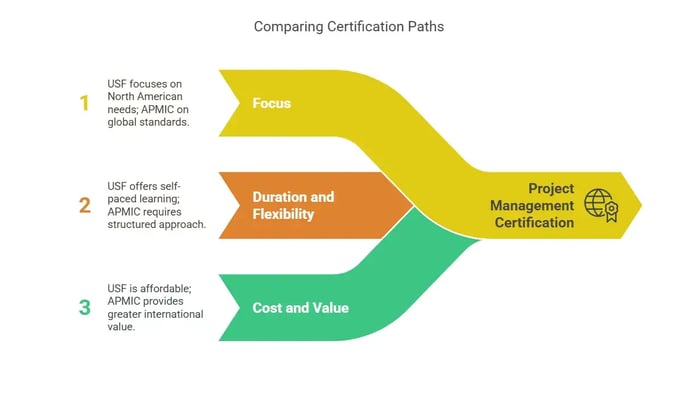
- Focus: While USF’s certification is designed particularly to meet the needs of professionals in North America, APMIC provides a more expansive certification that covers global standards and leadership strategies. It also offers a more comprehensive curriculum, with over 400 modules that span multiple industries and advanced topics.
- Duration and Flexibility: Both certifications offer flexibility, but USF’s online delivery system provides a more self-paced approach, ideal for those balancing work and study. APMIC’s certification requires a more structured approach and can be more intensive.
- Cost and Value: USF’s program is relatively affordable, especially considering its alignment with PMI standards. However, APMIC’s certification offers unparalleled breadth and depth, making it a more valuable option for professionals looking to work on international projects or manage multi-sector teams.
If you're still deciding which certification to pursue, the best project management certification for your career in 2025 might be the perfect guide to help you navigate through the options and choose the one that aligns with your aspirations.
The Growing Demand for Certified Project Managers
Project management is no longer just a job title; it's a critical role in every industry. Whether it's the construction of high-rise buildings, the launch of a new software application, or even the planning of a new marketing campaign, project managers are at the helm, steering projects to successful completion. But why is this role in such high demand?
Why Project Management Skills Are More Crucial Than Ever
In the fast-paced world of business today, companies can't afford delays, budget overruns, or poor-quality output. Every organization, from start-ups to large enterprises, relies on skilled project managers to ensure that their projects are executed efficiently and effectively. This growing demand is due to a combination of factors: increased globalization, technological advancement, and the shift toward Agile methodologies in many industries.
Global Trends
According to the Bureau of Labor Statistics, the project management profession is expected to grow by 6% over the next decade—faster than the average for all other professions. Moreover, PMI’s Pulse of the Profession reports that organizations with highly mature project management practices waste 28 times less money on projects than those with lower maturity levels. This underlines the importance of skilled project managers in ensuring organizational efficiency.
So, whether you're aiming to secure your future in project management or looking to enhance your existing skills, the USF Project Management Certification puts you right at the forefront of this booming industry.
For those just starting out in project management, you can explore the best entry-level project management certification, which provides insights on certifications that can help you break into the field with a strong foundation.
How to Prepare for the USF Project Management Certification?
Taking on a certification program is a significant commitment, but with the right preparation, you can excel.
Study Tips and Resources
Begin by reviewing the curriculum outline to get familiar with the key topics. USF’s certification program offers study guides, practice exams, and a wide range of online resources to ensure you’re well-prepared.
Time Management for Busy Professionals
As a working professional, balancing study and work can be a challenge. Set aside specific times each week dedicated to your studies, and break your learning into manageable chunks. USF’s flexible online format makes it easy to find the time to focus on your learning.
How the USF Project Management Certification Compares to Other Certifications
As a professional in the project management space, you’ll likely come across several certifications. But how does the USF Project Management Certification stack up against well-known credentials like the PMP or Prince2?
| Feature | USF Project Management Certification | PMP Certification (PMI) | APMIC Certification |
|---|---|---|---|
| Global Recognition | High (Aligned with PMI standards) | Very High (Globally recognized) | Very High (Global recognition with a focus on multi-sector applications) |
| Industry Focus | North America-focused (but applicable globally) | Global | Global (focus on multiple sectors and industries) |
| Curriculum Depth | Moderate depth (focus on key management skills) | Very deep (400+ hours of learning) | Extremely deep (400+ modules, leadership and advanced topics) |
| Duration | Approx. 6 months (Flexible online learning) | Approx. 3-6 months (depends on experience and study time) | Varies (can be more intensive, up to a year) |
| Cost | $1,000 - $2,500 | $500 - $2,500 | $2,000 - $5,000 |
| Flexibility | Highly flexible (online with self-paced learning) | Moderately flexible (requires specific prerequisites) | Very flexible (online learning with in-depth resources) |
| Career Opportunities | Project Manager, Scrum Master, Senior Manager roles | Widely recognized (various roles across industries) | Global project management, Senior leadership roles across industries |
| Certification Pathway | Prepares for PMP certification but is not directly awarded | Directly awards PMP certification | Comprehensive curriculum with a global certification awarded |
Overview of the Best Certifications in Project Management
The PMP (Project Management Professional) certification, awarded by PMI, is often considered the gold standard for project management. Similarly, Prince2 (Projects in Controlled Environments) is another widely recognized certification, particularly in Europe. APMIC, on the other hand, is known for offering a broader certification that covers multi-sector applications globally.
Which Certification Is Right for You?
Choosing between these certifications largely depends on your career goals, industry, and location. If you're looking to manage projects within North America, the USF certification is a perfect starting point due to its alignment with the PMI’s framework. However, if you're interested in a more globally applicable certification that spans various industries, the APMIC certification is highly comprehensive and perfect for professionals aiming to work in multiple sectors.
The USF Advantage
What makes the USF Project Management Certification stand out is its practical, flexible, and industry-focused approach. It provides a deep dive into essential project management skills, all while being manageable for busy professionals, thanks to its online format. If you’re looking to level up your skills while continuing to work, this certification gives you the tools to manage projects successfully in a wide range of industries.
Additional Resources to Enhance Your Project Management Skills
To further enhance your project management capabilities, here are some valuable resources you can download:
Project Management Handbook: This handbook is an excellent resource for project managers, offering in-depth insights into best practices, methodologies, and tools. It's an essential read for anyone aiming to excel in project management.
PMP Exam Preparation Guide: This guide is perfect for those pursuing the PMP certification. It provides a comprehensive overview of the exam structure, tips for success, and study resources. It's a great way to prepare yourself for the next step after completing the USF Project Management Certification.
Free Gantt Chart Tool: Effective project planning often requires detailed scheduling. Download this Gantt chart tool to easily visualize your project timelines, allocate resources, and track progress easily. It's a valuable asset for anyone managing complex projects.
These tools and resources will help you apply your project management knowledge more effectively, whether you’re managing your first project or taking on more advanced challenges.
10 Commonly Known Facts About Project Management Certification USF
- PMI’s PMP Certification is the Gold Standard: The Project Management Institute (PMI) is the world’s leading authority on project management standards and certifications.
- USF’s Certification Is Flexible: Unlike traditional programs, USF's certification is designed with busy professionals in mind, offering an online learning platform.
- Project Management Skills Are In Demand: Studies show that project management roles are among the fastest-growing in the job market, as reported by Forbes.
- Online Learning Is On The Rise: More professionals are turning to online programs to upskill while managing their busy careers, with EdTech Magazine showing a rise in online certification enrollments.
- Effective Communication Is Key: 70% of successful projects attribute their success to clear communication, as noted in PMI's Pulse of the Profession report.
- PMP and PMI Align with USF’s Curriculum: USF’s certification is designed to align with PMI's global standards, making it highly relevant for project management professionals.
- Global Companies Value Project Management Skills: Top employers like Google and Microsoft prioritize candidates with certified project management skills.
- Risk Management Skills Are Critical: Over 50% of project failures are attributed to poor risk management, as discussed in PMI’s Annual Report.
- Time Management Is Essential: Managing project timelines effectively is a skill highly valued by employers, especially in fast-paced industries, as detailed by the Harvard Business Review.
- Certifications Boost Earning Potential: On average, certified project managers earn 20% more than their non-certified counterparts, as found in the Robert Half Salary Guide.
Final Thoughts
The Project Management Certification USF offers incredible value for professionals looking to gain competitive skills and enhance their career prospects. It’s a flexible, rigorous, and globally recognized program that’s ideal for those serious about mastering project management principles. However, for a more globally expansive program with 400+ modules and leadership strategies, APMIC provides the comprehensive training that could make all the difference.
FAQs
What makes USF’s Project Management Certification unique?
The USF Project Management Certification combines practical, hands-on learning with a flexible online format, making it perfect for working professionals. It’s also closely aligned with PMI standards, ensuring that you gain globally recognized skills.
Can I complete the program without prior experience in project management?
Yes! The USF program is designed to cater to both beginners and mid-career professionals. While some familiarity with basic management terminology is helpful, it’s not a requirement.
How is the certification delivered?
The USF certification is fully online, with a mix of live sessions, recorded lectures, and interactive learning modules. This format allows you to study at your own pace while still benefiting from direct interaction with instructors and peers.
Does USF offer any financial aid or payment options?
Yes, USF provides various financial aid options, including installment-based payment plans to make the program more accessible to a broader range of students.
Will this certification help me switch to a project management career?
Absolutely! Many individuals use the USF Project Management Certification as a stepping stone to transition into project management from other fields. It’s an ideal option for those looking to switch careers or enhance their current skill set.
What career opportunities can I pursue after completing this certification?
With a USF Project Management Certification, you’ll be prepared for roles such as Project Manager, Scrum Master, Program Manager, and even senior leadership positions within project-driven industries.
Can I apply for the PMP exam after completing this certification?
While the USF certification does not directly award the PMP certification, it is fully aligned with PMI’s PMP standards, so it serves as excellent preparation for the PMP exam.
How does the USF certification compare to APMIC’s certification?
USF’s certification focuses on practical skills and industry-specific knowledge, while APMIC offers a more extensive, globally recognized program with over 400 modules. Both certifications are highly regarded, but APMIC’s program is more comprehensive and international in scope.

